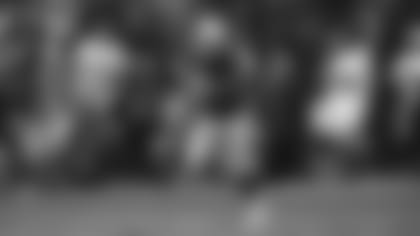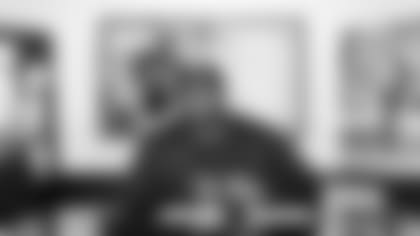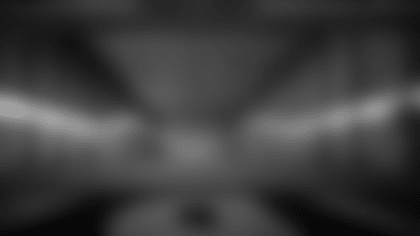Offensive line coach Bob Wylie demonstrates blocking techniques on one of the reporters. Photo by Tony Gonzales
Q: Back at training camp, you had a lot of guys vying for five spots. Were you confident then that it was going to work out as well as it has?
Coach Wylie: Yeah. Watching them work, I didn't know exactly what five they were going to be but their work habits – they did a really good job. I'm all into your effort and I've always believed it doesn't take any ability to give effort; you know what I mean? Once you give effort, you've got a chance that it's going to turn they way you want it to. So, the effort – they've been a fine job with the effort that they've put forth.
Q: What's your philosophy and what kind of coach do you see yourself to be?
Coach Wylie: I really just consider myself nuts and bolts, down to earth, nothing fancy, no thrills. They know that they've got to carry their lunch pail for work and they've got to go to work. They've got to work all day and at the end of the day, they're going to leave and when they come back tomorrow, we're going to do the same thing again. That's what I believe. If you keep them going – the same things over and over; I mean you guys watch my group. I haven't changed a drill since training camp. Make it better, no matter how much, you don't know how far it will go. You just keep working them and I don't tell them that they're the best offensive line in the world. I say 'Guys, we're here; we're just going to work and that's all we're going to do.' That's all we know what to do is work and that's what I intend to do with them. Some days, it will be good days and some days, it won't be good just like every other sport. Some guys have good days, some guys don't have good days and the toughest thing I think to teach them even at this level or any level is to teach them how to stay in the moment. What happens is that the male ego takes over and if you miss a block or you have a missed assignment or you let up a pressure or a sack, then the male ego takes over and you want to take it out on the next play. Instead, you need to forget it. Whether you win or lose the play, you need to have a short memory. There's a point in time when a quarterback gets in the huddle and says, 'I've got it. You better get rid of it' because you've got to play the next play because that's the most important thing. The last play is lost in time forever. You don't know what the next one is going to be. The only thing you can handle is what's going to happen right here, right now and that's the toughest thing I think in any sport is to give that talk to your players.
Q: How did your guy's vision [Hue Jackson's] match, did he take from yours at all, and what are your guy's philosophies as far as blocking?
Coach Wylie: [Laughs] Philosophy of blocking? My whole philosophy of blocking is that you need to create leverage, period. I don't care what position whether it's a tight end, receivers, running backs, the whole object of the deal is that the body has two power producing angles. There's an upper body power angle and there's a lower body power angle and it's the way it's worked since the good dawn of time, where your body's constructed. I try to teach them how the body works and how you want to segment the upper body power angle from the lower body power angle. Once that happens, then you're in control. Now I can stand up here and tell you guys that, but it's easier said than done. So, the body only works one way. Give me a guy – we'll use you [demonstrates on a reporter] – I'm going to make you stronger and you won't have to lift a weight. Put your arms straight up. I'm going to pull them down, you stop me. Right now, what I want you to do is turn your thumb up. I'm going to pull it down again and then you stop. Go! Feel stronger? I made you stronger and you didn't have to lift a weight. So, you teach them how the body works and there's probably about 10 or 12 of those little things you do with the body that show you, 'Hey, if you keep your body angles in the right direction, you bend your knees and you can create the leverage concept, segmenting the upper body power angle from the lower body power angle, then we have a chance and that's all we can ask for is to get a chance.
Q: Talk about leverage. Is that an area where you had to work with Samson a little bit, because he's not as big as most centers are?
Coach Wylie: Well, he's kind of a natural at leverage because he's not as big. I was very fortunate to have Olin Kreutz in Chicago and they're the same type of player. Olin's played a little bit longer, he's a little bit older but I had him his first six years and it was the same deal. 'What's the number one thing I need to work on?' Every player used to ask me that and I said the number one thing all players need to work on is that all pro players play too high. All pro players play too high, so you need to bend your legs, get down, understand the concept of leverage and work on it every day.
Q: How do these guys respond to your teaching lessons right off the bat? The guys that have been here have been under Tom Cable for a lot of years. Did you feel like you had to start from scratch with a lot of them?
Coach Wylie: Well, I just told them, 'Look guys, I respect what every coach does.' I've been around offensive line coaches all my life, most of it anyway, and I run that clinic in Cincinnati where we get them from all over the country to come in and listen. Everybody has their own way of doing it. It's not a right way or wrong way; it's their way and people have different successes. Different guys have different success on how they teach it. Whether right or wrong, it's what you can get them to do, period. If they find out that you're not full of B.S. and that you can make them better, then they listen – they buy in. Once they buy in – they keep working. Look, they're still working now. You walk over there, Wiz [Steve Wisniewski] has got them and he's working with them because they buy in to, 'Hey, it takes hard work and it takes effort to get better.'
Q: The left side of your line with Jared [Veldheer] and Stefen [Wisniewski] have less than 25 games experience at the NFL level. How much of a challenge was it getting them ready because you didn't have them the whole offseason and have you ever worked with any other two younger offensive linemen?
Coach Wylie: See, everybody keeps saying that. Oh yeah, right here and in Denver. I had two rookies in Denver last year.
Q: What's been the biggest challenge then?
Coach Wylie:Well the thing is what everybody seems to forget is that years ago when I first got in the league, we never had an offseason. We didn't have OTAs; we didn't have an offseason weight training and conditioning program. You saw the players for mini-camp and then you saw them again in July. So, we just went a whole 180 degrees or 360 or 180 or whatever it is back to where we started 25-plus years ago. Everybody is saying this and that; no, we didn't have any of that. You picked the things that are fundamentally sound and correct the same things you would have picked fundamentally sound and correct when they were introducing it in the first mini-camp in 1988 and you go with it.
Q: When you started coaching [Jared] Veldheer, what did you want him to work on?
Coach Wylie: I could tell you that, but I'm not going to tell you that [laughs]. They've got to play on Sunday and the last thing I need is 'I've got to get Veldheer working on this.' I've got to tell you I've got him working, so don't ask me about specific player's good things and bad things. I won't do that. They all have their specific goals that they have to achieve as a player and they know what they need to do to work and get there.
Q: In general, how has Veldheer progressed?
Coach Wylie: They've all done a good job working. Not just Jared; they've all done a good job and they work hard. I'm very fortunate that Mr. Davis has supplied kids that like to work, like to give good effort, and that's a plus. As long as the kids want to work and give effort, I'll work with them. It's the guys that – not here, not here at all – on some other teams that I've been on, they don't want to put the time and the effort in because they think they've made it because they're in pro football. Those are the guys that going to give you trouble.
Q: How much time do you get to work with the running backs and tight ends on blocking, to keep everyone on the same concept?
Coach Wylie: In my individual period and we have meetings that we meet together as a whole group. So, they understand the concepts, now they have to work them everyday like anything else. As a line coach, you never have enough time.
Q: These guys like your magic?
Coach Wylie: Yeah. I think the defensive backs really believe it's real [laughs]. 'Show me another trick Coach – How do you do that?'
Q: So how did this all start and how did you incorporate it into your meetings?
Coach Wylie: I visited the sick kids in the hospital years and years ago and I first met Sam Weiss. Sam is a big magician. He's into magic. I started – I think was with the Jets at the time; I learned some from Sam at the Bengals. I was at the Jets and we went and played in St. Louis, we were playing either Buffalo or Kansas City because St. Louis wanted to get a team back because they lost it to Arizona. They put us up in Union Station and there was a magic shop. Well, my thing is that I go visit the sick kids in hospitals on Friday afternoons and I bring them pictures of the guys and books and visit with the guys. I saw this magic store, so I stopped and said, 'Wouldn't it be fun if I could do a couple of tricks for these guys.' Well, 20 years later, I've got 150 different books, videos, and DVDs. And God rest his soul, when I found out I was coming here Dr. Albo I have a book that he wrote. And Jon Kingdon said I have to introduce you to Dr. Albo and God rest his soul then he passed on and I never had the chance. But, that's how it kind of all started and sometimes in the meetings, their attention span is only so long so you need to break it up a little bit. So, sometimes I go up there – make something appear, make something disappear. It keeps their attention, keeps them going, keeps them talking, keeps it a little light in the air, instead of always pounding, pounding, and pounding them. I think as a teacher – I've been brought up as a teacher for years, but as a teacher, you find different teaching methods to get your point across. Like you guys watch these commercials, you know, some of these screwy commercials they have on TV nowadays that don't make any sense at all; because they don't make any sense, you remember the product. So, it's kind of on those kind of lines.
Q: Will you make [Vince] Wilfork disappear this weekend?
Coach Wylie: Well, we're going to try.
Q: You've been a lot of places Coach. You've coached in the Canadian Football League. Who are some of your biggest influences and who have you learned from the most that's kind of crafted the coach you are today?
Coach Wylie: The way I am today? God, I tell you, I'm very fortunate. Years ago, I was a junior high school football coach and I met a guy named Jim McNally and Jim McNally was the line coach at Boston College. We got to be very friendly and I'm still very friendly with him today. He went from Boston College to Wake Forest to Wake Forest to the Bengals in '81 and I would go visit Jimmy at the Bengals when Forrest [Gregg] was there. So I would spend the whole training camp with the Bengals learning and watching how to coach the offensive line with Jimmy and it just started right there. There was a six-year span where I never had a vacation. I would go and work with the Bengals for their training camp period and I'd go back to the school I was coaching at. All of a sudden, I landed a job. I went from college to college and I landed a job but I think it was the passion for the sport, always searching. I went from Pop Warner football to junior high school football to high school football to college football to pro football. I went right up the ladder. I can't tell you because flying airplanes, playing the drums in a band, and I was teaching high school history and economics, and I was coaching football. The next thing I know, I've got 20-plus years in the National Football League. Honestly, I can't tell you; it's just the passion you have. You guys have passions to write and produce the news. It's just the passion you have to do something and the love of the game; the Kevin Costner movie 'For the Love of the Game', you really have to have that inert passion in your heart to keep working everyday because sometimes, you work 100-plus hours a week and that's what you do as a living. If you lose a game, you figure you gave that 100 hours away and you'll never get it back but you do it all over again because it's the love you have for the sport and for your players that make you do it.
Q: Some of those guys like Cooper [Carlisle] and Samson are labeled as zone blockers…
Coach Wylie: I don't believe in whose their own blocker and who is this blocker; I don't believe in it, I really don't. Guys make that stuff up. You can either double team and gap block people or you can zone block them one-on-one. The zone blockers, you're just working with the other guy so instead of doubling them one way, you're doubling them the other way. Instead of the play going back – the blocking scheme going back, it's going to the play. I really don't get into that, 'Well, he's a zone blocker.' I don't believe in that. They can be what they need to be when they need to be it.


























